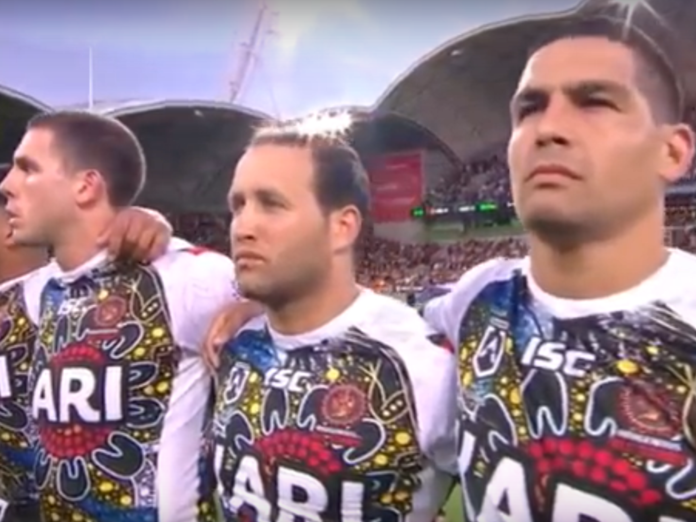An all-star rugby league game between the Australian aborigine and the New Zealand Maori teams drew controversy for one reason but failed to draw controversy for another. The failed controversy is why there are no similar Anglo-Saxon teams. This would be admittedly be difficult seeing as it’s getting harder and harder to spot a white guy among all the South Pacific islanders who play professionally in Australia, but a token gesture to those who invented the game and founded the league and even the nation in which all these guys play would be nice.
But I digress.
The actual controversy is due to the fact that the Australian team refused to sing the national anthem.
NRL fans have been divided over the controversial moment the Indigenous All Stars team did not sing the Australian national anthem ahead of their clash with the New Zealand Maori All Stars on Friday night at AAMI Park in Melbourne.
The pre-game entertainment was a rich celebration of Aboriginal and Maori cultures, but many fans could not look past the moment Channel 9 cameras showed seemingly the entire Indigenous team choosing not to sing Advance Australia Fair after the New Zealand side had earlier sung God Defend New Zealand.
Fans have been divided on many points, including if the Indigenous team deliberately chose not to sing the anthem while trying to make a statement or if they chose not to sing the anthem to show their respect while remaining silent.
Skipper Cody Walker called for the national anthem to be changed, saying the current song “doesn’t represent myself and my family”.
They’re happy to take the cash and play the white man’s game but they’re supposedly offended at the same time. Righto, bro. Keep fighting the man, eh?
But what is most galling about such an unpatriotic display is the fact that apartheid exists in Australia and has done since the naive and stupid passing of the Native Title Act in 1993. The Anangu Pitjantjatjara Yankunytjatjara Lands in South Australia are one of the many results of that landmark decision. The lands cover 103,000 square kilometres and the population in the 2016 census was 2,276, which amounts to 45 sq km per person.
Nestled in that enormous area which is almost the size of England is one tiny little outback community based on opal mining. The community is entirely populated by whites and has been there since the early 80s. It is called Mintabie and it is over 1000km from Adelaide along a dirt road. And the community is about to be kicked out by the South Australian government.
Last year the South Australian government moved to terminate the lease arrangement of the town eight years early. Come July 1, all those living in the predominantly white township must depart, leaving their homes and businesses behind and handing back control to the executive board of the Anangu Pitjantjatjara Yankunytjatjara Lands.
A series of unsubstantiated accusations have been leveled at the town’s residents, accusing them of taking advantage of the local aboriginal community; exactly the sort of generic and bleeding heart accusations that government inquiries just love. The town’s residents are doomed simply by the color of their skin. All of that land given away for that aboriginal tribe, who exist entirely on taxpayer handouts mind you, isn’t enough. They have to kick out the whites because they can.
APY Lands general manager Richard King says the real issue at play isn’t discrimination but the fact townspeople have degraded the environment with deep mine shafts and contaminated water to the point that it is “dangerous” for Anangu to practise their traditions there.
“Both Labor and Liberal should be commended for this decision,” he says. “They (the residents) were engaging in various activities that really put Anangu in danger and were taking advantage.
“The real victims are the Aboriginal people, who have had to deal with their culture being abused by this little group that has been allowed to exist on the edge.”
“We need to make the area safe and have a full assessment of the environmental degradation that’s occurred.”
When asked about how the closure of Mintabie relates to the Uluru Statement of the Heart and self-determination, King says tangible action is more important than grandiose gestures.
One of the town’s residents fled communism in Yugoslavia.
“When communism took over, my father didn’t believe he should give his property to the state and they killed him for it … it makes me emotional because now it looks like that’s my destiny, too.”
Communism takes what you have not because of who you are but because of what it represents. We don’t have communism in Australia, yet. What we have is apartheid because these residents are losing everything that they have built because of the color of their skin.
And yet at the same time we have professional and highly paid athletes demonstrating that their nation doesn’t represent them. The grievance train never arrives. No matter how much you give them it will never be enough. Opening this can of worms in the first place was the real mistake. Because now we live in an Australian apartheid.
This article was originally published at https://pushingrubberdownhill.com/, where Adam Piggott publishes regularly and brilliantly. You can purchase Adam’s books here.










